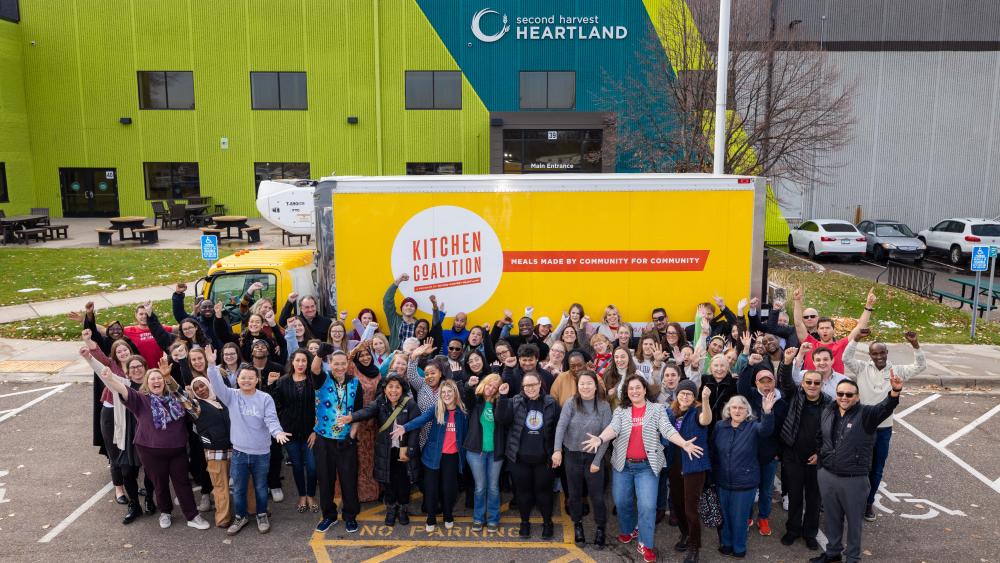
Forging Connections at the 2023 Kitchen Coalition Summit
In November, Second Harvest Heartland hosted the third-ever Kitchen Coalition Summit at our Brooklyn Park facility. Kitchen Coalition, a program of Second Harvest Heartland, has built a network of local restaurants and caterers who turn food bank ingredients into nutritious, freshly prepared meals. The summit gives kitchens and distribution partners the opportunity to connect with one another, learn about Kitchen Coalition strategy, and share stories and successes from the last year.
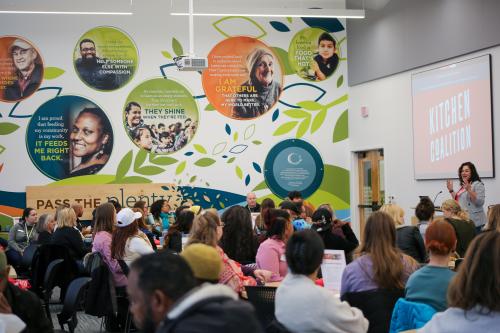
Robin Manthie, Director of Kitchen Coalition, addresses kitchen and distribution partners during the Kitchen Coalition Summit
It also gives participating kitchens and distribution partners an opportunity to meet and connect—to thank the chefs for the hundreds of meals they prepare each week, and for the chefs to get to meet and talk with the people that are providing nutritious meals that keep so many of our neighbors fed.
Philip Dorwart, chef and owner of Create Catering in Minneapolis, has partnered with Kitchen Coalition since its inception in 2020 and credits the Kitchen Coalition program with making sure that his kitchen stayed in business. “When you’re a small business owner, the last thing you want to do is go out of business. With Kitchen Coalition, we get to engage with community organizations that we otherwise wouldn’t have.”
Creative Catering shows that not only does working with Kitchen Coalition benefit the kitchens and their staff financially, but it forges valuable connections between restaurants and their partners, which further entrenches them in their communities. Create Catering produces close to 2,000 meals per week for Kitchen Coalition partners, including 150 meals a week for The Sanneh Foundation.
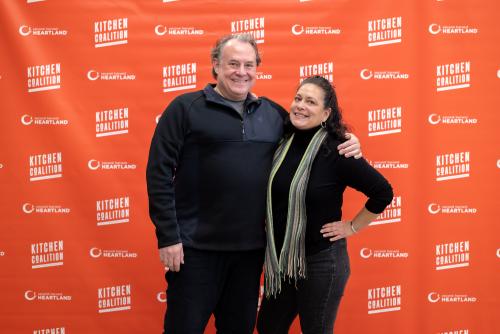
Kitchen Coalition brings together restaurants and distribution partners, such as Philip Dorwart of Creative Catering and Rachel Rubin of The Sanneh Foundation.
“We are surveying the seniors—our elders in the community,” says Rachel Rubin of The Sanneh Foundation. “We get a lot of different types of feedback and my favorite thing is that we were able to share the feedback and everyone was so responsive and it has made a world of difference. People are excited. They let us know how yummy things are, and we’re just super excited to continue to partner.”
Astrid Berger is the Cook Fresh program coordinator at Urban Roots of Minnesota, a nonprofit that runs youth employment and internship programs. “In the Cook Fresh program, we learn both the duality of food justice and cooking skills in one program. The Kitchen Coalition meals have been such a lifeline for us. Not only do they get to see how their food is grown and where that food ends up, but they actually get to be a part of the creation of that and receive and give to the community at the same time.”
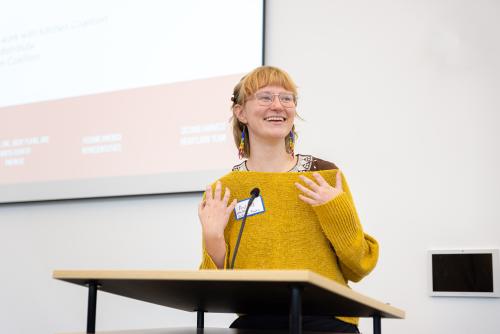
Astrid Berger of Urban Roots discusses how Kitchen Coalition helps keep kids in the Cook Fresh program fed.
Astrid was excited to meet the chefs that make the meals for Cook Fresh at the Kitchen Coalition Summit. “I got to talk with Miguel, the head chef at Homi. It sounds like our kids are going to go visit their kitchens and get to see the production in action. He was so excited to come to us, and we can now all make a meal together.”
“As a young kid, I used to go to kitchens like mine to get a meal,” says Miguel. “So having the restaurant, having the time, having the workers, and now having all the ingredients that we need to prepare meals, it was easy for us to just go for it.”
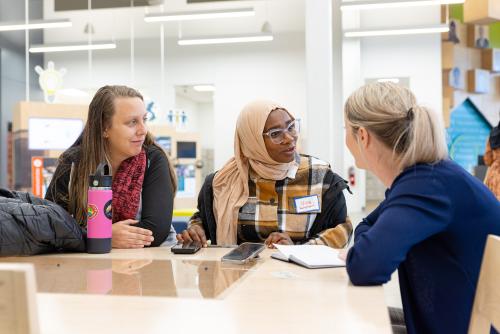
Sara and Nura of Feeding Frogtown connect with other distribution partners at the Kitchen Coalition Summit.
Many of Kitchen Coalition’s kitchens provide prepared meals to multiple distribution partners: from organizations that bring hot meals to the unhoused, to campus meal distributions at colleges and universities around the Twin Cities.
“We stay pretty busy between our restaurant and the meals. But you know, I wouldn’t trade it for anything. It’s really kept me going,” says Trung Pham, owner of Pham’s Rice Bowl. “Thinking back, I was one of those kids who went to college without a lot of food. So, to be a part of this and to be distributing food out to campuses—it’s really a way for me to reconnect back to when I was younger.”
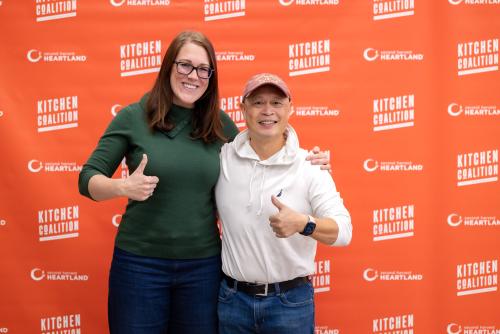
Trung Pham of Pham's Rice Bowl and Amanda from Good Neighbors Center pose for a photo together.
Beth Jones, executive chef of the Campus Club at the University of Minnesota distributes meals to family housing units on campus. “We had a meeting about two years ago and it almost felt too easy. It was like ‘you got the truck, we got the meals’. So now we’re making four-portion family meals for mostly graduate students and a lot of international students who have children at the Commonwealth Cooperative in Saint Paul, and the Como Student Cooperative.”
“We partner with Cheng Heng to distribute meals,” says Zachary, manager of the food shelf at the Food Access Hub, a partnership between St. Joseph of Carondelet and St. Catherine University. “Because we’re a private college, we can’t get access to government funding," says Mollie, a student intern. "So, we really appreciate the work that you’re doing.”
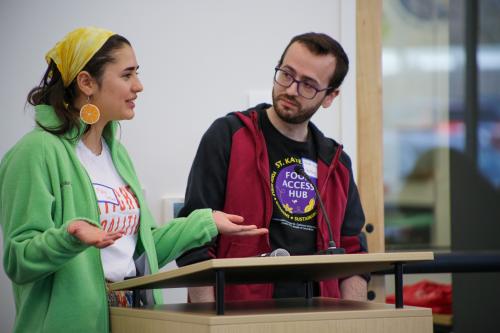
Mollie and Zachary of the Food Access Hub talk about the burdens that college students face when it comes to preparing meals.
Kitchen Coalition and Second Harvest Heartland were thrilled to be able to bring together our kitchen and distribution partners for a morning of connection and conversation. Forging these bonds and providing an understanding of where prepared meals come from and how they are distributed to our neighbors is a powerful tool in the fight against hunger.
